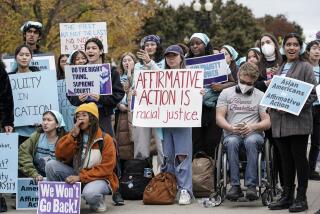Editorial: Does the ‘good corporate citizen’ get a say in the political process?

- Share via
This year, in criticizing U.S. firms that moved their headquarters to lower-tax countries, President Obama said that corporate executives are paid not only to maximize profits but also to be “good corporate citizens.” That corporations can and should be “good citizens” is a familiar idea, and a controversial one.
On one hand, business leaders often emphasize their commitment to the public good. In its list of the “100 Best Corporate Citizens” of this past year, Corporate Responsibility magazine considered factors including philanthropy, employee relations and support for efforts to cope with climate change. Businesses also have played a significant part in social and political causes such as the civil rights movement and the campaign for marriage equality.
But if businesses are expected to look beyond the bottom line to the welfare of the society in which they operate, should they also have a say in the political process? The answer is yes — but that role is not identical to the role played by individual citizens.
The role of profit-making businesses in politics captured public attention five years ago when the Supreme Court, in its Citizens United decision, struck down a federal election law placing limits on independent election-related activities by corporations. This page thought the decision went too far, but we also have been wary of attempts to overrule Citizens United through a constitutional amendment that would limit free-speech and other rights to “natural persons.” Mitt Romney was widely mocked in 2011 when he said, “Corporations are people, my friend.” But Romney had a point: Corporations are composed of people whose lives and fortunes are affected by government policies and whose rights can be violated by government overreaching; the same is true of other types of businesses, as well as unions and other associations.
Even if they aren’t good “corporate citizens,” businesses have a right to express themselves on political issues, just as they have the right to lobby Congress and other legislative bodies. The trouble arises because the vast influence of major corporations gives them disproportionate power to speak and lobby and raises the potential for corruption. As Justice John Paul Stevens noted in his dissent in Citizens United: “In the context of election to public office, the distinction between corporate and human speakers is significant. Although they make enormous contributions to our society, corporations are not actually members of it.... The financial resources, legal structure, and instrumental orientation of corporations raise legitimate concerns about their role in the electoral process.”
Because of Citizens United, corporations may now spend unlimited sums on “electioneering communications” (they are still rightly prohibited from contributing directly to candidates and their campaigns). Interestingly, many corporations have decided not to take advantage of the opportunities created by Citizens United because they fear that open partisan advocacy would alienate shareholders and customers. But corporate funds also can find their way into the budgets of tax-exempt “social welfare” groups that engage in political advertising but don’t have to disclose their donors. Congress and the Internal Revenue Service should close that loophole. If money is going to flood politics, at a minimum the public should know its source.
Like Obama, we believe that society benefits when businesses look beyond the bottom line and support the betterment of their communities and the nation. But even the best “corporate citizen” will be concerned primarily with its own interests. It’s appropriate that the law and rulings by the courts reflect that reality.
The future of citizenship
Over the last three months, we have explored many facets of citizenship, a concept that includes but also transcends the Constitution’s definition of a citizen as a person “born or naturalized in the United States, and subject to the jurisdiction thereof.” Many of the editorials in this series have dealt with adapting our notions of citizenship and civic participation to recent developments, including large-scale immigration, dual citizenship and the nation’s increasing ethnic, linguistic and religious diversity.
But what of the future?
As with so many other areas of modern life, citizenship in the 21st century will be shaped not only by economic and demographic trends but also by advances in technology. Thanks to the Internet and social media, Americans are exposed to political arguments (not all of them civil) that they wouldn’t have encountered in the past. Online voting could further involve citizens who until now have found exercising the franchise inconvenient.
More far-reaching changes are imaginable. Even in California, with its robust tradition of initiative and referendum, citizens have influenced public policy largely indirectly, through the ballot box. In general, that representative model has served the country well. But technology raises the possibility of a dramatic increase in direct democracy. Would instant electronic plebiscites enhance democracy at the cost of reasoned deliberation?
Like the nation in which it is exercised, citizenship in the 21st century remains a work in progress.
To read previous editorials in this series, as well as opinion pieces by guest writers and readers, go to latimes.com/Citizenship.
Follow the Opinion section on Twitter @latimesopinion
More to Read
A cure for the common opinion
Get thought-provoking perspectives with our weekly newsletter.
You may occasionally receive promotional content from the Los Angeles Times.









